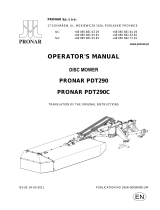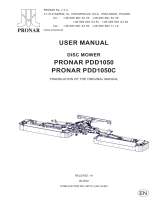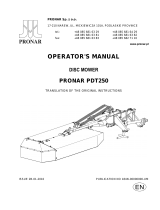Page is loading ...

PRONAR Sp. z o.o.
17-210 NAREW, UL. MICKIEWICZA 101A, PODLASKIE PROVINCE
phone: +48 085 681 63 29 +48 085 681 64 29
+48 085 681 63 81 +48 085 681 63 82
fax: +48 085 681 63 83 +48 085 682 71 10
www.pronar.pl
OPERATOR'S MANUAL
DISC MOWER
PRONAR PDF300
PRONAR PDF300C
TRANSLATION OF THE ORIGINAL INSTRUCTIONS
ISSUE 2B-10-2013 PUBLICATION NO. 312N-00000000-UM


DISC MOWER
PRONAR PDF300
PRONAR PDF300C
MACHINE IDENTIFICATION
SYMBOL /TYPE:
SERIAL NUMBER

INTRODUCTION
Information contained herein is current at date of publication. As a result of improvements,
some numerical values and illustrations contained in this publication may not correspond to the
factual specification of the machine supplied to the user. The manufacturer reserves the right to
introduce design changes in machines produced that facilitate operation and improve the quality
of their work, without making minor amendments to this Operator's Manual.
This Operator's Manual is an integral part of the machine's documentation. Before using the
machine, the user must carefully read this Operator's Manual and observe all
recommendations. This guarantees safe operation and ensures malfunction free work of the
machine. The machine is designed to meet obligatory standards, documents and legal
regulations currently in force.
The manual describes the basic safety rules and operation of the PRONAR PDF300 / PRONAR
PDF300C disc mower. If the information stated in the Operator's Manual needs clarification then
the user should refer for assistance to the sale point where the machine was purchased or to
the Manufacturer.
MANUFACTURER'S ADDRESS:
PRONAR Sp. z o.o.
ul. Mickiewicza 101A
17-210 Narew
CONTACT TELEPHONES
+48 085 681 63 29 +48 085 681 64 29
+48 085 681 63 81 +48 085 681 63 82

SYMBOLS APPEARING IN THIS OPERATOR'S MANUAL
Information, descriptions of danger and precautions and also recommendations and prohibitions
associated with user safety instructions are marked:
and also preceded by the word "DANGER”. Failure to observe the instructions may endanger
the machine operator's or other person's health or life.
Particularly important information and instructions, the observance of which is essential, are
distinguished in the text by the sign:
and also preceded by the word "ATTENTION". Failure to observe the instructions may lead to
damage to the machine as a result of improper operation, adjustment or use.
In order to focus the user's attention on the need to perform maintenance, the relevant section
of the Operator's Manual is marked with the pictogram:
Additional tips and advice for machine operation are marked:
and also preceded by the word "TIP".
DIRECTIONS USED IN THIS OPERATOR'S MANUAL
Left side – side to the left hand of the operator facing in the direction of machine's forward
travel.
Right side – side to the right hand of the operator facing in the direction of machine's forward
travel.


TABLE OF CONTENTS
1
BASIC INFORMATION 1.1
1.1
IDENTIFICATION 1.2
1.2
PROPER USE 1.3
1.3
EQUIPMENT 1.5
1.4
TERMS & CONDITIONS OF WARRANTY 1.5
1.5
TRANSPORT 1.7
1.6
ENVIRONMENTAL HAZARDS 1.10
1.7
WITHDRAWAL FROM USE 1.10
2
SAFETY ADVICE 2.1
2.1
BASIC SAFETY RULES 2.2
2.1.1 USE OF MACHINE 2.2
2.1.2 HITCHING AND UNHITCHING FROM CARRYING VEHICLE 2.3
2.1.3 HYDRAULIC SYSTEM 2.4
2.1.4 TRANSPORTING THE MACHINE 2.5
2.1.5 MAINTENANCE 2.6
2.1.6 WORK OF MOWER 2.8
2.1.7 OPERATION OF PTO SHAFT 2.9
2.2
DESCRIPTION OF RESIDUAL RISK 2.10
2.3
INFORMATION AND WARNING DECALS 2.11
3
DESIGN AND OPERATION 3.1
3.1
TECHNICAL SPECIFICATION 3.2
3.2
GENERAL DESIGN 3.3
3.3
LINKAGE 3.5
3.4
DRIVE ASSEMBLY AND CUTTING UNIT 3.7
3.5
HYDRAULIC SYSTEM 3.9
3.6
CONDITIONING ASSEMBLY (PDF300C) 3.10

4
CORRECT USE 4.1
4.1
PREPARING FOR WORK 4.2
4.2
CHECKING TECHNICAL CONDITION 4.5
4.3
HITCHING TO TRACTOR 4.6
4.4
TRANSPORTINGTHE MACHINE 4.10
4.5
SETTING AND MOWING 4.13
4.5.1 SETTING THE MOWER INTO THE OPERATING POSITION AND
ADJUSTING THE CUTTING HEIGHT 4.13
4.5.2 ADJUSTMENT OF CUTTER BAR PRESSURE 4.15
4.5.3 SETTING THE SWATH WIDTH IN PDF300 MOWER 4.16
4.5.4 SETTING THE SWATH WIDTH IN PDF300C MOWER 4.18
4.5.5 SETTING THE SWATH CONDITIONING INTENSITY IN THE
PDF300C MOWER 4.19
4.5.6 MOWING 4.21
4.6
DISCONNECTING FROM TRACTOR 4.23
5
MAINTENANCE 5.1
5.1
CHECKING AND REPLACING CUTTING BLADES 5.2
5.1.1 INSPECTION AND REPLACEMENT OF THE CUTTER BAR
BLADES 5.2
5.1.2 INSPECTION AND REPLACEMENT OF SWATH CONDITIONER
FLAIL BLADES (PDF300C) 5.4
5.2
DRIVE SYSTEM MAINTENANCE 5.6
5.3
CUTTERBAR MAINTENANCE 5.10
5.4
HYDRAULIC SYSTEM OPERATION 5.13
5.5
LUBRICATION 5.15
5.6
STORAGE 5.19
5.7
TIGHTENING TORQUE FOR NUT AND BOLT
CONNECTIONS 5.20
5.8
TROUBLESHOOTING 5.22

SECTION
1
BASIC
INFORMATION

PRONAR PDF300 / PDF300C SECTION 1
1.2
1.1 IDENTIFICATION
FIGURE 1.1 Location of the data plate.
(1) data plate
The PDF300 /PDF300C front disc mower has a data plate (1) located on the left side of the
linkage frame. When buying the disc mower check that the serial numbers on the machine
agree with the number written in the WARRANTY BOOK, in the sales documents and in the
OPERATOR'S MANUAL
The meanings of the individual fields found on the data plate (FIGURE 1.1) are presented in
the table below:
A - Machine name, B - Machine type/symbol,
C – Year of manufacture, D – Machine tare weight,
E – Serial number, F – Quality Control stamp,
G – Unfilled box or extension of name (box A)

SECTION 1 PRONAR PDF300 / PDF300C
1.3
1.2 PROPER USE
The PDF300 /PDF300C front disc mower is constructed according to current safety
requirements and engineering standards.
The PDF300 / PDF300C front disc mower is designed to cut low stemmed green fodder
(grass, lucerne, etc) on stone free cultivated fields with a level surface. Swath conditioner in
PDF300C mower breaks the mown plant stalks and also removes layer of wax from the plant,
which effectively accelerates the drying process. Transporting people, animals or other
materials is forbidden and regarded as contrary to the intended purpose. During the use of
the machine comply with all road traffic regulations and transport regulations in force in the
given country, and any breach of these regulations is regarded by the Manufacturer as use
contrary to its intended purpose.
IMPORTANT
The mower must not be used for purposes other than those for which it is intended, in
particular:
• for transporting people and animals,
• for transport of whatever materials or objects.
Using it as intended involves all actions connected with the safe and proper operation and
maintenance of the machine. In connection with this the user is obliged to:
• carefully read the OPERATOR'S MANUAL and comply with its recommendations,
• understand the machine's operating principle and how to operate it safely and
correctly,
• adhere to the established maintenance and adjustment plans,
• comply with general safety regulations while working,
• prevent accidents,
• comply with the road traffic regulations and transport regulations in force in a
given country, in which the machine is used,
• carefully read the Operator's Manual and comply with its recommendations,
Unauthorised repairs and modifications of the machine without prior consent of the
Manufacturer will be regarded as use contrary to the intended purpose. The machine may

PRONAR PDF300 / PDF300C SECTION 1
1.4
only be used by appropriately trained users, who are aware of the dangers, design and
operation of the machine. Repairs to the machine shall only be made by qualified personnel
(in the warranty period all repairs must be performed in the warranty service, indicated by the
Manufacturer). Maintenance and repairs that can be performed by the user, are described in
SECTION 5 „MAINTENANCE”.
TABLE 1.1 Agricultural tractor's requirements
CONTENTS UNIT REQUIREMENTS
Hydraulic system
Hydraulic oil:
Pressure rating of the system
Hydraulic connections
-
MPa
-
HL 32
16
Front hydraulic connection or access
to rear connection
Implement suspension system (TPL
- three-point linkage)
Front three point linkage system
-
Category II according to ISO 730
Power take-off shaft (PTO)
Rotation speed
Number of splines on PTO shaft
RPM
pc.
1,000
6
Other requirements
Minimum power
- PDF300
- PDF300C
kW /
Horsepower
kW /
Horsepower
44 / 60
55 / 75
The mower may only be used by persons, who:
• are familiar with the contents of this publication and with the contents of the
agricultural tractor Operator's Manual,
• have been trained in mower service and safe operation,
• have the required authorisation to drive and are familiar with the road traffic
regulations and transport regulations.

SECTION 1 PRONAR PDF300 / PDF300C
1.5
1.3 EQUIPMENT
TABLE 1.2 Mower equipment
EQUIPMENT
STANDARD
OPTION
Operator's Manual •
Warranty book •
„Comer T401110ENC12F12” PTO shaft •
1.4 TERMS & CONDITIONS OF WARRANTY
PRONAR Sp. z o.o., Narew guarantees the reliable operation of the machine when it is used
according to its intended purpose as described in the OPERATOR'S MANUAL. Defects
discovered during the warranty period will be removed by the Warranty Service. The repair
period is specified in the Warranty Book.
The warranty does not apply to those parts and sub-assemblies of the machine, which are
subject to wear in normal usage conditions, regardless of the warranty period. Consumables
include the following parts/sub-assemblies:
• working discs and slides
• cutting blades and pins securing cutting knives,
• tarpaulin covers,
• bearings.
The warranty service only applies to factory defects and mechanical damage that is not due
to the user's fault.
In the event of damage arising from:
• mechanical damage which is the user's fault, caused by road accidents,
• by inappropriate use, adjustment or maintenance, use of the machine for
purposes other than those for which it is intended,

PRONAR PDF300 / PDF300C SECTION 1
1.6
• use of damaged machine,
• repairs carried out by unauthorised persons, improperly carried out repairs,
• making unauthorised alterations to machine design,
the user will lose the right to warranty service.
TIP
Demand that the seller carefully and precisely fills out the Warranty Book and warranty
repair coupons. A missing date of purchase or sale point stamp, may make the user
ineligible for any warranty repair or refund.
The user is obliged to report immediately on noticing any wear in the paint coating or traces
of corrosion, and to have the faults rectified whether they are covered by the warranty or not.
For detailed Terms & Conditions of Warranty, please refer to the WARRANTY BOOK
attached to each machine.
Modification of the mower without the written consent of the Manufacturer is forbidden. In
particular, do NOT weld, drill holes in, cut or heat the main structural elements of the
machine, which have a direct impact on the machine operation safety.

SECTION 1 PRONAR PDF300 / PDF300C
1.7
1.5 TRANSPORT
The mower is ready for sale completely assembled and does not require packing. Solely the
operation and maintenance documentation of the machine and possibly flexible guards for
additional equipment require packing.
IMPORTANT
Before transporting independently, the tractor driver must carefully read this operator's
manual and observe its recommendations. When being transported on a motor vehicle
the mower must be mounted on the vehicle's platform in accordance with the transport
safety requirements. The driver of the vehicle should take particular care while driving.
This is due to the vehicle's centre of gravity shifting upwards when loaded with the
machine.
Delivery is either by transport on a vehicle or independently. Transport of the mower is
permissible connected to a tractor provided the tractor's driver familiarises himself with the
machine's Operator's Manual and particularly with information concerning safety and
principles of connection and transport of mower on public roads. Do NOT drive the tractor
with mower connected when visibility is limited. During independent transport by road the
mower should always be set in transport position properly secured - see SECTION 4.4
"TRANSPORTING THE MACHINE ”. Comply with the regulations of the traffic regulations
concerning lights and indicators.
When loading and unloading the mower, comply with the general principles of workplace
health and safety for reloading work. Persons operating reloading equipment must have the
qualifications required to operate these machines. Only use lifting equipment with a lifting
capacity greater than the weight of the mower given on the data plate. This also applies to
cables, belts and chains used during reloading.

PRONAR PDF300 / PDF300C SECTION 1
1.8
FIGURE 1.2 Transport lugs.
(1)- transport lug, (2)- transport straps fixing eye
The mower should be attached to lifting equipment in places designed for this purpose
(FIGURE 1.2), i.e. to transport lug (1) and hole (2) in the linkage frame. When lifting the
mower take particular care due to the possibility of tipping over the machine and the risk of
injuries from protruding parts.
DANGER
Nobody may be in the manoeuvring zone during transferring mower to other form of
transport.
TIP
When loading with lifting equipment, put the mower in its transport position and lock it.
Support leg should be lowered and secured with a pin.

SECTION 1 PRONAR PDF300 / PDF300C
1.9
The machine should be attached firmly to the platform of the vehicle using straps or chains
fitted with a tightening mechanism. The fastening equipment used must have a valid safety
certificate. Exercise particular caution when lifting the machine. To keep lifted machine in the
correct direction it is recommended to apply additional guy cables. During the loading work
particular care should be taken not to damage paint coating.
IMPORTANT
Do NOT secure lifting slings or any types of securing elements to hydraulic cylinders.
FIGURE 1.3 Location of centre of gravity of the PDF300 / PDF300C mower.
TABLE 1.3 Centre of gravity.
Mower model
Dimension
(FIGURE 1.3) Unit PDF300 PDF300C
A mm 1690 1670
B mm 895 850
C mm 525 510

PRONAR PDF300 / PDF300C SECTION 1
1.10
1.6 ENVIRONMENTAL HAZARDS
A hydraulic oil leak constitutes a direct threat to the natural environment owing to its limited
biodegradability. While carrying out maintenance and repair work which involves the risk of
an oil leak, this work should take place on an oil resistant floor or surface. In the event of oil
leaking into the environment, first of all contain the source of the leak, and then collect the
leaked oil using available means. Remaining oil should be collected using sorbents, or by
mixing the oil with sand, sawdust or other absorbent materials. The oil pollution, once
gathered up, should be kept in a sealed, marked, hydrocarbon resistant container, and then
passed on to the appropriate oil waste recycling centre. The container should be kept away
from heat sources, flammable materials and food.
Oil, which has been used up or is unsuitable for further use owing to a loss of its properties
should be stored in its original packaging in the conditions described above.
1.7 WITHDRAWAL FROM USE
In the event of decision by the user to withdraw the machine from use, comply with the
regulations in force in the given country concerning withdrawal from use and recycling of
machines withdrawn from use.
Before proceeding to dismantle equipment oil shall be completely removed from hydraulic
system, cutting blades and transmission Locations of drain plugs and method for draining oil
are described in SECTION 5.
When spare parts are changed, worn out or damaged parts should be taken to a collection
point for recyclable raw materials. Waste oil and also rubber and plastic elements should be
taken to establishments undertaking the utilisation of such waste.
IMPORTANT
During dismantling personal protection equipment shall be used i.e. protective clothing,
boots, gloves and protective goggles etc.
Avoid contact of skin with oil. Do not allow used oil to spill.

SECTION
2
SAFETY
ADVICE

PRONAR PDF300 / PDF300C SECTION 2
2.2
2.1 BASIC SAFETY RULES
2.1.1 USE OF MACHINE
• Before using the machine, the user must carefully read this Operator's Manual
and the WARRANTY BOOK. When operating the machine, the operator must
comply with the recommendations.
• The mower may only be used and operated by persons qualified to drive
agricultural tractors and agricultural machines and trained in the use of the
machine.
• If the information stated in the Operator's Manual is difficult to understand, contact
a seller, who runs an authorised technical service on behalf of the Manufacturer,
or contact the Manufacturer directly.
• Careless and improper use and operation of the machine, and non-compliance
with the recommendations given in this operator's manual is dangerous to your
health.
• Be aware of the existence of a residual risk, and for this reason the fundamental
basis for using this machine should be the application of safety rules and sensible
behaviour.
• The machine must never be used by persons, who are not authorised to drive
agricultural tractors, including children and people under the influence of alcohol
or other drugs.
• Non-compliance with the safety rules of this Operator’s Manual can be dangerous
to the health and life of the operator and others.
• The machine must not be used for purposes other than those for which it is
intended. Anyone who uses the mower other than the way intended takes full
responsibility for himself for any consequences of this potentially improper use.
Use of the machine for purposes other than those for which it is intended by the
Manufacturer may invalidate the warranty.
• The machine must not be used when not in working order.
• Do NOT leave tractor driver's seat when the tractor is moving.
/













